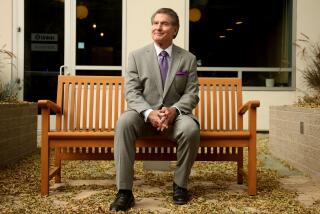For Superman, Letters of Hope
- Share via
Only days after the accident, the letters started pouring in, thousands of letters, some addressed simply, “Superman, USA.”
Within three weeks, 35,000 pieces of mail for Christopher Reeve had been received at the University of Virginia Medical Center in Charlottesville, where the actor was taken after suffering a broken neck in a fall while jumping his horse on May 27, 1995.
It was, said his wife, Dana, a “really quite stunning” show of support. Hang-in-there messages came from a San Quentin death row inmate, from Buddhists, Catholics and Jews, children and adults, celebrities and senators, an L.A. parking lot attendant and a former New York cabby.
Dana Reeve has compiled about 200 of them in her new book, “Care Packages: Letters to Christopher Reeve From Strangers and Friends” (Random House). She calls the book a long-overdue “thank you letter” to all who sent words of encouragement--and a love letter to her husband.
Why did his accident prompt such an outpouring (to date, about 400,000 letters)? Dana Reeve, in Los Angeles on a book tour, credits Superman, the film role--three times reprised--for which the 47-year-old actor is best known:
“Superman is a traditional archetype in our culture, this all-powerful but benign doer of good, protector and friend. If he could succumb to the frailties of mortal man, what’s to become of the rest of us?”
And, she added, Reeve also is a “good guy” who’s always been there for his friends and for people in need, and to support causes that have ranged from the environment to the defense of Chilean actors persecuted under the Pinochet regime.
Dana Reeve, 37, an actress and singer who put her career on hold for a year to help care for her husband, has emerged as a role model for the millions who are unpaid, unheralded care-givers. While appreciating the pats on the back, she’s not entirely comfortable with the image.
First, she said, she had the luxury of choice: “A lot of people can’t just stop work.” And “we’re fortunate to have the financial resources” of the upper-middle class, if not “a bottomless pit of money.”
Having said this, she wears the mantle of role model with grace, guts and warmth. Case in point: a book signing in Century City, where a young woman, buying the book for her mother, told Reeve she’d been “a real inspiration” to her mother while she was caring for a son injured in a car accident. A 22-year-old man told Reeve his mother had “played a similar role” to hers when he’d had cancer five years ago. Asking Reeve to autograph a book, he said, “She’s going to love this.”
Reeve is doing the book tour “in spurts” so as not to be away from home too long. At an interview in her Santa Monica hotel suite, she mentioned having just spoken by phone with Christopher. “He was having sort of a down day,” having had discouraging news about the pace of fund-raising for spinal cord injury research, a cause to which he’s put a human face.
She talks openly about her husband’s physical condition--he is a quadriplegic, paralyzed from the chest down and largely dependent on a ventilator to breathe--and how their lives have been turned inside-out, pragmatically, emotionally and financially.
The Details of Life as a Quadriplegic
There are skilled nurses around the clock to help with “the daily living tasks, getting lunch, scratching an itch, whatever.” There are monitors throughout their Bedford, N.Y., house so he “doesn’t have to have someone in the room [with him] all the time.”
Since his accident, Christopher Reeve’s primary source of income has been speeches, for which he commands five figures. Still, with medical bills of $300,000 a year, Reeve said, “there’s the specter of ‘What if Chris couldn’t work anymore?’ ” They have maxed out one of three medical insurance policies--”God forbid we should have something else come along.”
Still, she insisted, they are lucky; they have insurance and personal wealth. Her sympathies are with those who have neither and “end up on state aid, end up in nursing homes, even if they’re 23. It’s horrific.” She has become an advocate for the Washington, D.C.-based National Family Caregivers Assn., which seeks validation of and compensation for caretakers.
Christopher and Dana Reeve met in 1987 at the Williamstown (Mass.) Theater Festival and, after five years together, married in 1992. He has two children by a longtime relationship with former model Gae Exton--Matthew, 19, a sophomore at Brown University, and Alexandra, 16, who lives in England with her mother. Dana and Christopher’s son, Will, 7, was not yet 3 at the time of his father’s accident.
How do you explain something so awful to a 3-year-old? She said, “We said it was a bad thing, and we wish it hadn’t happened . . . and we said we were going to be OK.” Their honesty, she believes, enabled Will “to trust us when we said, ‘You’re going to be fine, and we’re going to be fine.’ ”
A hobby horse in a playroom at the University of Virginia became the vehicle for Will’s self-initiated play therapy.
“He would fall off this hobby horse and say, ‘My neck, my neck!’ ” Reeve said. “I knew it was healthy, but it was awfully hard to watch.”
A forthright woman, Reeve doesn’t duck questions, including intimacy questions, asking only that sex not be the focus of the article.
“Obviously, sex isn’t what it used to be. We always had a great sex life, so that’s a tremendous loss. We’re still as intimate as we used to be. We just lock the door and turn the monitor off. We refuse to become roommates.” (In response to a caller to a recent Larry King show who asked Christopher Reeve the first thing he plans to do when he can walk again, Reeve smiled and said, “It won’t involve walking.”)
She looks for small victories, indications that he might be regaining arm movement, a possible first sign of spinal cord regeneration, and dreams of the day when there will be “fewer nurses in our house,” when “we are able to go to the movies, the two of us, or go out for an anniversary dinner, just the two of us.”
There are tiny signs offering hope.
“He now has feeling down his spine. There are patches of his body where he’s gaining sensation, but it is infinitesimal change,” she said.
He rarely has pain, has not been hospitalized for two years and has avoided muscle atrophy through physical therapy. Strapped into a parachute harness and suspended from a cable, he can “walk” on a treadmill, utilizing his spinal cord’s memory.
Like him, Dana Reeve has down days, but, she said, “if I feel down, I can do what I’ve always done--go see a friend, walk the dog, have a cup of tea.” With Christopher’s encouragement, she’s doing some stage and TV work, which provides a respite from daily reality.
Too Well-Known for Support Groups
Early on, she joined a support group but found that, because of the Reeves’ celebrity, she was looked to as “the wellspring of all knowledge.” She was uncomfortable, too, knowing that anything she said might wind up in the media. She’s found that one-on-one talks with women in similar predicaments helps her, and them, feel not “so alone.”
The idea for her book came while Christopher was in the ICU, before being transferred to Kessler Institute for Rehabilitation in New Jersey. Sifting through the thousands of letters, she realized, “Chris had the unique and rare opportunity to be shown during his lifetime how many friends he has and how much they care.”
Shaquille O’Neal sent an autographed size-24 athletic shoe that was suspended above Reeve’s hospital bed. Others sent holy water from Lourdes, child’s-eye drawings of Superman in flight, and suggestions for “cures” ranging from bee venom therapy to soybean lotion to blue-green algae to “get a cat.”
Paraplegics and quadriplegics sent encouraging words, as did those who’d had close scrapes with disaster. A New York college student, now recovered, sent a rosary given to her as a child after she was critically injured by a drunken driver. She told of how her parents brought “Superman” videos to her hospital room: “As long as you were a click away, I was never alone.”
A Fresno man told of popping out of a two-week coma after being partially paralyzed by a bullet and screaming at a minister who was reading the 23rd Psalm over him. A New Jersey man sent a silver medal won in a Special Olympics.
A touching letter from a man in Minnesota recalled how he found solace watching “Superman” during the trauma of his parents’ divorce when he was 17. “For two hours I believed in magic and goodness.”
Katharine Hepburn wrote, characteristically, “My golly, what a mess.”
Letters also came from President Clinton, former First Lady Nancy Reagan, musician Paul McCartney and film stars Robert De Niro, Patricia Neal, Hugh Grant and Emma Thompson. Lost in the shuffle was one from Princess Diana, recalling that she and Reeve had danced together once and hoping that they’d dance again.
Now Correspondents Want Something
Even today, the letters keep coming. But, Dana Reeve said, “the dynamic has changed. The vast majority now are people looking for either advice or help.”
Christopher Reeve has used his celebrity to advocate for others with spinal cord injuries. Since its founding in 1996, the Christopher Reeve Paralysis Foundation, which he chairs, has raised $3 million, of which $525,000 has gone to quality-of-life grants and the rest to research grants.
The former are “really gratifying,” his wife said. If someone can get a van, or live independently, they no longer feel like “helpless and hopeless pawns.”
Christopher has turned down film offers, she said, because “he doesn’t want to perpetuate the stereotype of a man in a wheelchair. And when you’re in the shape he’s in, there’s no time for diplomacy.” He did play the wheelchair-bound character in ABC’s remake of “Rear Window.”
One of the “hidden gifts” resulting from the accident, she added, was his discovery that he was “a director trapped in a leading man’s body.” In the spring, he will direct an eccentric comedy, “Heartbreaker,” for Nicolas Cage’s production company, Saturn Films.
Christopher--an athletic man who was a sailor, private pilot and scuba diver--has vowed to walk again by the time he is 50. Dana said, “It’s what he has to hold onto. He has to believe that it’s not a pipe dream. Otherwise, it would be too hard to continue to fight.”
She takes things day by day, “dealing with what we’ve got,” drawing hope from doctors who tell them that “it’s not a matter of if, it’s a matter of when” medical science will find a way to reverse spinal cord injuries.
*
Beverly Beyette can be reached by e-mail at beverly.beyette@la times.com.
More to Read
Sign up for our Book Club newsletter
Get the latest news, events and more from the Los Angeles Times Book Club, and help us get L.A. reading and talking.
You may occasionally receive promotional content from the Los Angeles Times.







